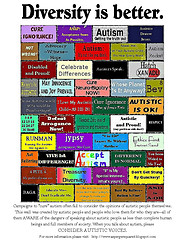Esperanto
Many moons ago when I was just a wee young thing [translation = eternally optimistic] I was confident that this universal language would be the norm by the time I was an adult. Brits are notorious for the weak language facility, especially when compared to the rest of Europe. I skipped over the need to learn Esperanto myself, as I was having more than enough difficulty with French, German and Latin. I longed for the day when I would understand everyone, no matter how they spoke, a time of understanding and tolerance. No more conjugating verbs, declensions and fiddling about with the past imperative. No more pesky ‘amo, amas, amat.’
I have cause to review my weakness in communication skills, as I examine my son’s Speech and Language evaluation prior to his IEP.
The word that leaps of the page at me is ‘unusual.’ His speech delay is well documented but the words ‘atypical’ and ‘unusual’ keep on cropping up.
When I first came across ‘atypical,’ when all terminology was confusing, I was non-plussed. His kind of autism was ‘atypical,’ as was his speech delay. This description tripped me up initially. I had to keep reminding myself that there was ‘typical’ autism, whatever that might be, and ‘typical’ speech delays, goodness knows what they might be, and then there was my son, the ‘atypical’ one.
His speech pathologist gave him the usual barrage of tests prior to the IEP. From this she produced her report, her detailed report and recommendations based upon her findings. She is spot on in every respect. I scribble all over her report, as is my wont, as my son sidles up to snuggle into my side. I underline the numerous identifiable reasons as to why he sounds so much younger than his chronological age of nearly 8. [translation = when he is able to speak loud enough for anyone to hear him] I also ponder her query regarding the pronunciation of the letter ‘R.’ Is this due to immaturity or the English disease? [translation = r’s do not feature as prominently in Britishspeak as they do in American English]
“What you are do?” he asks mid nuzzle.
“I’m reading this report from Mrs. B about your speech.”
“Speech?”
“Yes.”
“It is good it is bad?”
“Good! All good, very good.”
“I is good at dah speech.”
“Indeed you are.”
His feet pummel me, pleased and happy with his performance during testing. He beams with satisfaction, “maybe…..maybe….maybe I don neeed dah speech therapy no more!” I think maybe that depends upon who is listening? [translation = future perfect]


